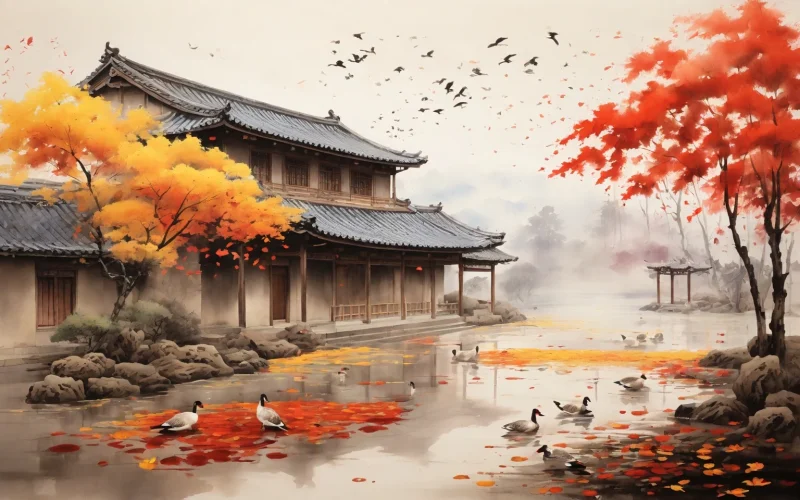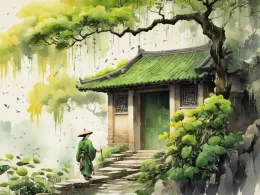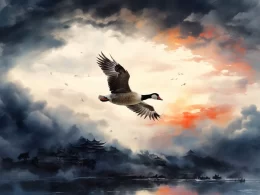To the Celestial Court a proposal was made,
And I am banished eight thousand li away.
To undo the misdeeds I would have given aid,
Dare I have spared myself with powers in decay?
The Ridge veiled in barred clouds, where can my home be seen?
The Blue Pass clad in snow, my horse won't forward go.
You have come from afar and I know what you mean:
Not to leave my bones there where miastic waves flow.
Original Poem
「左迁至蓝关示侄孙湘」
韩愈
一封朝奏九重天,夕贬潮州路八千。
欲为圣明除弊事,肯将衰朽惜残年!
云横秦岭家何在?雪拥蓝关马不前。
知汝远来应有意,好收吾骨瘴江边。
Interpretation
This poem was written during Han Yu's demotion to the position of governor in Chaozhou. Han Yu had angered the imperial court by his stern advice to Emperor Xianzong regarding the relics of the Buddha, which led to his exile. The poem expresses his frustration and helplessness in the face of fate, as well as his deep concerns for his homeland and future. The entire poem reflects Han Yu's unwavering character and the tragic fate of a hero in decline.
First Line:“一封朝奏九重天,夕贬潮州路八千。”
(In the morning, I submit a memorial to the emperor, and by evening, I am demoted to the distant Chaozhou.)
These two lines are simple yet powerful, showing how quickly Han Yu's fate changed due to his memorial, as he was exiled to the distant Chaozhou. The poet uses the act of submitting a memorial to reveal the sudden and harsh reversal of his fortune and emphasizes the arduousness of the journey by stating "eight thousand miles."
Second Line:“欲为圣明除弊事,肯将衰朽惜残年!”
(I wish to eliminate corruption for the wise emperor; how could I abandon my remaining years just because I am old and frail?)
This line directly expresses Han Yu’s loyalty and integrity. He believes that his actions were for the benefit of the state, and despite his aging, he remains committed to his ideals and responsibilities, undeterred by the decline of his own fate. It demonstrates his resolve to continue his work regardless of personal hardship.
Third Line:“云横秦岭家何在?雪拥蓝关马不前。”
(Clouds obstruct the Qinling mountains—where is my home? Snow piles up at the Blue Pass, and my horse cannot advance.)
These lines use vivid imagery to convey the poet's deep longing for home and the difficulties ahead. The Qinling Mountains and Blue Pass serve as geographical symbols of his loneliness and helplessness. The poet’s heart is weighed down with sorrow as he contemplates the uncertainty and difficulty of his future path.
Fourth Line:“知汝远来应有意,好收吾骨瘴江边。”
(I know you have come from afar with a purpose; it would be good to collect my bones by the pestilential riverbank.)
This line carries deep emotion. Han Yu is aware that his relative has come a long way and feels both gratitude and concern for the future. He calmly arranges for his posthumous matters, implying that in Chaozhou, plagued by marshy miasma, he may not survive. His resignation and sorrow come through, showing his acceptance of an inevitable fate.
Writing Features
The poem’s emotional layers are rich, with a concise yet profound style. Han Yu uses his personal experience to portray the grief of a hero fallen from grace, physically and emotionally exhausted. The poem not only expresses anger but also reflects the poet’s helplessness in the face of future hardships. The descriptions of the Qinling mountains and the Blue Pass symbolize the poet’s inner sense of entrapment and despair. Finally, his calm acceptance of fate as he speaks of the "pestilential riverbank" highlights his resilience in the face of reality.
Overall Analysis
While this poem expresses the poet's personal misfortunes, it also holds deeper political and existential meanings. Through four concise stanzas, Han Yu demonstrates his loyalty and integrity, as well as his concerns and frustrations. The contrast between his former position at the imperial court and his current exile to Chaozhou highlights the rapid reversal of his fate. Each stanza reinforces his emotions of loneliness and resilience, especially in the face of an uncertain future. Despite his pessimism and resignation, he does not show any hint of giving up. Instead, he faces the challenges and even death with a composed attitude. The use of imagery such as “clouds blocking the Qinling” and “snow piling up at the Blue Pass” successfully conveys the poet’s internal solitude and his foreboding sense of the difficult road ahead.
Insights
This poem showcases Han Yu's spirit as a loyal and upright minister, who remains true to himself and fearless in the face of fate. Modern readers can draw strength from it, understanding that no matter how challenging life becomes, one should maintain faith and courage to confront life's obstacles. Additionally, the poet’s composed attitude toward death serves as a reminder that, in the face of life's uncertainties and adversities, maintaining calmness and resilience is a vital quality for everyone to possess.
Poem translator
Xu Yuan-chong (许渊冲)
About the poet
Han Yu (韩愈), 768 - 824 AD, was a native of Luoyang. Orphaned at the age of three, he was raised by his sister-in-law and was later admitted as a scholar. Han Yu's poems strive to be innovative and majestic, with a unique style that had a great influence on Song poetry writing.











